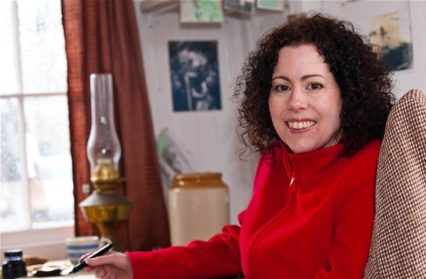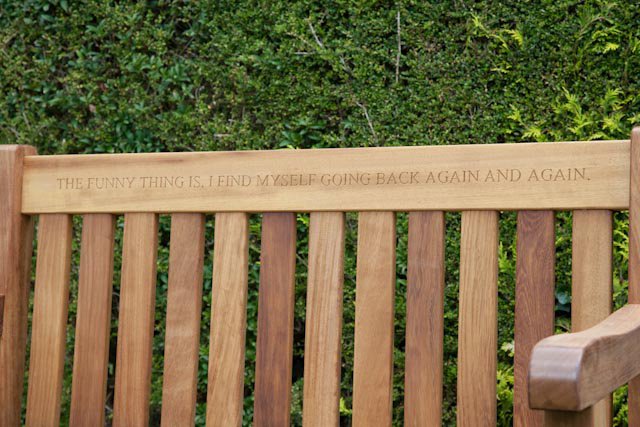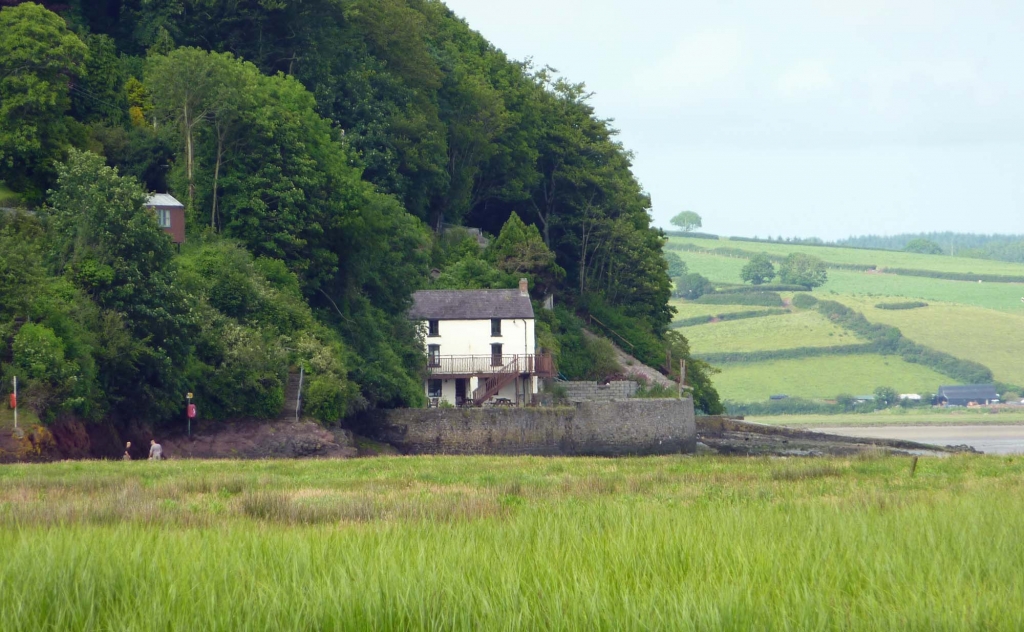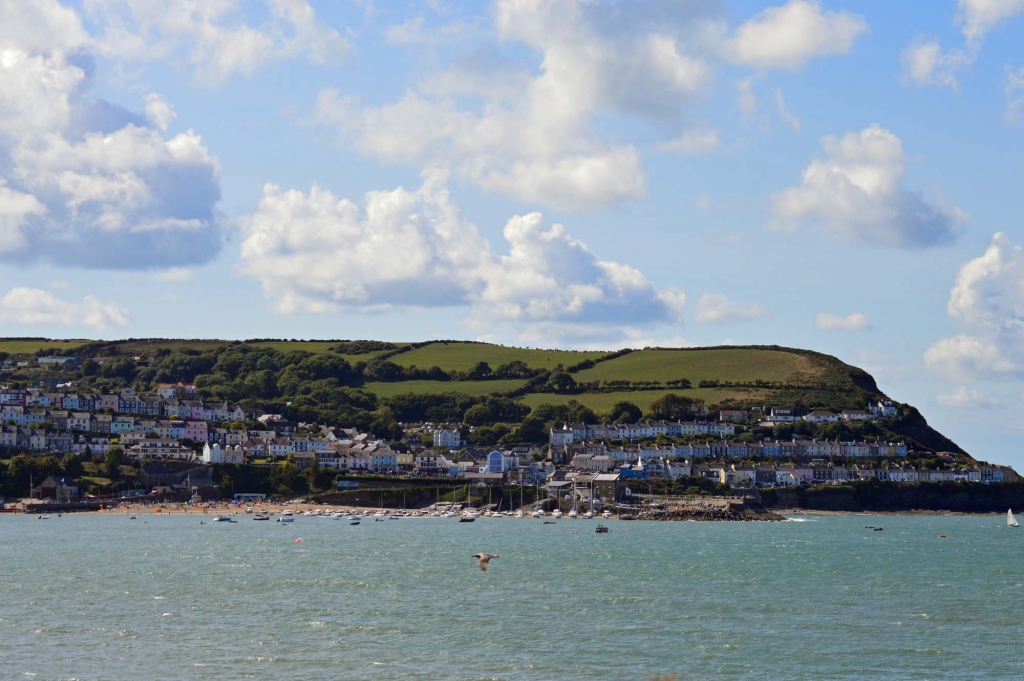Continuing our series of articles leading up to #DylanDay on May 14th, Hannah Ellis writes a very personal reflection of the iconic poet, her grandfather Dylan Thomas’ legacy, and what International Dylan Day means to her.
At least once a year, we visit Laugharne in West Wales where my grandfather Dylan Thomas is buried alongside his wife, my grandmother, Caitlin.
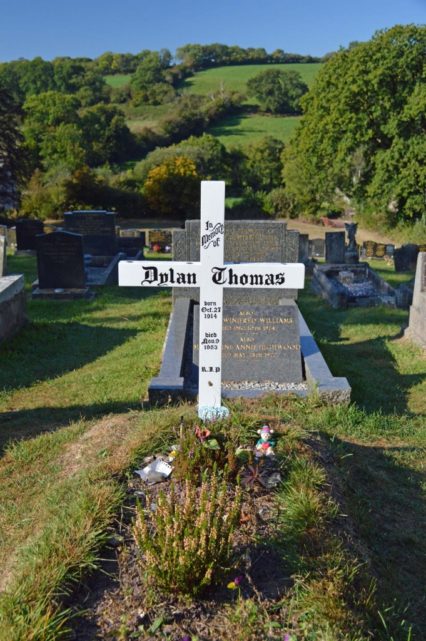 On a sunny April morning this year as I was putting flowers on their grave, my son Charlie went to play on the grass area below. In between adding water to the dried up vase, pulling out the odd weed and removing a miniature whisky bottle left by an adoring fan, I gazed across at Charlie. To my surprise instead of running around like a headless chicken (this would usually be his first course of action if presented with a wide open space) he was lying on the ground and was flat on his back. He stayed stony still for many minutes and then changed to a cross-legged sitting position reminiscent of a Buddha meditating. Now, as you can imagine, all sorts of things were going through my mind. Is Charlie having a spiritual reaction to the area? Are the sea noises and sounds helping him connect with nature? Is he absorbing the peace and tranquilly? … Can he feel his grandfather’s presence?
On a sunny April morning this year as I was putting flowers on their grave, my son Charlie went to play on the grass area below. In between adding water to the dried up vase, pulling out the odd weed and removing a miniature whisky bottle left by an adoring fan, I gazed across at Charlie. To my surprise instead of running around like a headless chicken (this would usually be his first course of action if presented with a wide open space) he was lying on the ground and was flat on his back. He stayed stony still for many minutes and then changed to a cross-legged sitting position reminiscent of a Buddha meditating. Now, as you can imagine, all sorts of things were going through my mind. Is Charlie having a spiritual reaction to the area? Are the sea noises and sounds helping him connect with nature? Is he absorbing the peace and tranquilly? … Can he feel his grandfather’s presence?
When I had finished, despite being reluctant to disturb Charlie because he looked truly relaxed in a way I had never observed before, I quietly called him back. As we were returning to the cottage we were staying in, I told him about what I had seen and asked if the place had made him feel special. The thing is, when he chooses to, my son can be very articulate so I was expecting him to reveal some sort of profound otherworldly reaction that he had experienced. However, what I was not expecting was, “I was seeing what it felt like to be dead.” “Oh,” I responded despondently. Still with a vague hope of a mystical element to his peculiar conduct, I persisted. “But what were you doing when you were sitting cross legged.” “Oh that, I was being a ghost of course, like the ones in Harry Potter.”
Oh dear. It seems Mummy had completely misread the signals and it was all very straightforward after all. Regardless of my misunderstanding, Charlie has a genuine connection with Laugharne. He should do really as he has been visiting since he was three weeks old when we arrived shattered (as all new parents are) in a car jam-packed with baby equipment. We were there to scatter my mum’s ashes at the Boathouse – her much loved childhood home. In the garden, we have put a bench overlooking the estuary with the words, “The funny thing is I find myself coming back again and again.”
But what is it about this small sea town that keeps bringing us back, generation after generation. For me, apart from it being a place where I feel close to my family, it is the calmness accompanied by the sounds and smells of the sea, as well as the fact that I can fully switch off when I’m there. (The internet coverage is pretty sketchy so I am unable to answer e-mails or even check Facebook – what bliss!)
I imagine that Dylan had the same experience when returning to Laugharne from big capitals like London and New York. The rush and chaos of those busy cities must have been overwhelming at times for the sensitive young poet. There is evidence to support this too as it was in Laugharne and in other Welsh sea towns, such as Swansea and New Quay, where Dylan was able to concentrate and write some of his most iconic poems including “The Force That Through The Green Fuse Drives the Flower”, “Fern Hill”, “Do Not Go Gentle Into That Good Night”, “Over Sir John’s Hill” and “Poem in October”. He wrote about these places for his radio broadcasts too, “A Child’s Christmas in Wales”, “Return Journey”, and of course, his play for voices, Under Milk Wood.
My grandfather’s work is closely associated with place, whether it be the inspiration, or the subject of his writing. I have seen men and women in tears walking through Fern Hill, or open mouthed in shock during a Return Journey walk as they imagined the horror Dylan must have felt seeing his home town obliterated following a three night’s blitz.
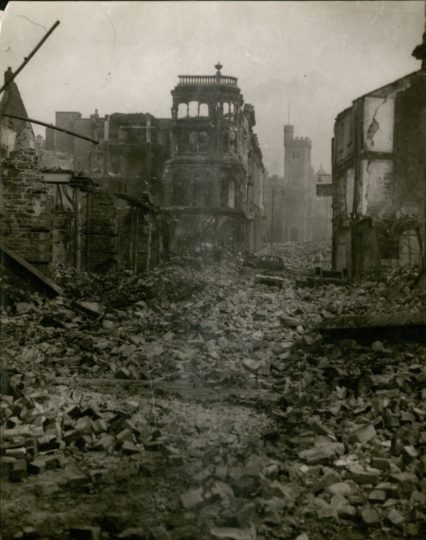 I’ve been affected by his places as well. After following the Birthday walk in Laugharne and strolling through Cwmdonkin Park in Swansea I had a strong urge to revisit the poems, “Poem in October” and “The Hunchback in the Park”, and I believe I appreciate his powerful words more as a result.
I’ve been affected by his places as well. After following the Birthday walk in Laugharne and strolling through Cwmdonkin Park in Swansea I had a strong urge to revisit the poems, “Poem in October” and “The Hunchback in the Park”, and I believe I appreciate his powerful words more as a result.
I feel quite strongly that place can have a profound influence on our understanding of my grandfather’s literature and that a visual and sensory experience can help people connect with his poetry and prose. And that is why, perhaps somewhat controversially, I believe Wales could and should exploit Dylan Thomas’s links to the country more and to create a strong literary tourism market. And before I get accused of dumbing Dylan down – something I would never want to do, as he was a meticulous craftsman – I’m not suggesting setting up vans selling Milk Wood burgers or having No Good Boyo pints at the local pub. What I am proposing is to have a structure that is a co-ordinated Dylan Thomas trail that allows, as a direct benefit of going to Dylan’s places, a deeper understanding of his poetry.
A linked up approach to Dylan Thomas’s places began to happen during Dylan Thomas 100, the centenary of his birth and this had a very positive impact on my grandfather’s legacy. On the first International Dylan Thomas Day (Dylan Day) in 2015 I went to the Wheatsheaf (the pub where my grandparent’s met) in London. I talked with young people who had recently discovered my grandfather’s work, as well as older people who had rediscovered it. They had taken trips, or returned, to Wales and, as a result, they were equally keen to delve in further and learn more. This was my confirmation (if I actually needed one) that there was momentum following DT 100 to have a regular date when we could continue to remember and celebrate Dylan Thomas.
Over the past three years, the Welsh government has funded the day. It’s growing each year, but it will take time to get it recognised on the international calendar. Sadly, the funding is coming to an end. Without future investment, continuing the day into 2018 and beyond becomes more challenging. It seems a shame Wales does not see the same potential for Dylan Day, especially after people have put in so much work and energy, however, for now, it is this year I want to focus on…
As I see it, Dylan Day is a wonderful opportunity to establish a lasting legacy for my grandfather’s poetry, but I also hope it will be a ‘date in the diary’ when people can put aside a moment or two to find creative ways to bring words alive. Whether that is by watching a specific Dylan Day show, finding inspiration by visiting one of Dylan’s places, putting on your own event (big or small), reading or writing some poetry, or simply sharing a favourite line or two on social media. However you want to be involved on May 14th, or whatever you do, it all adds to the occasion and will ensure it is as big a celebration as possible.
To find out more about International Dylan Thomas Day and the Love the Words writing competition go to www.discoverdylanthomas.com/news-events/international-dylan-thomas-day
To find out more about Dylan Thomas go to www.discoverdylanthomas.com.
To find out more about the Wheatsheaf click here.
Hannah is a teacher, writer and consultant. You can learn more about her by visiting the website – www.hannahellisconsultancy.com
You might also like…
Meeting Dylan – To celebrate Dylan Thomas at 100, Jasper Rees collected statements from those who met the poet.
This piece is part of Wales Arts Review’s collection, Dylan Thomas from the Archive.


